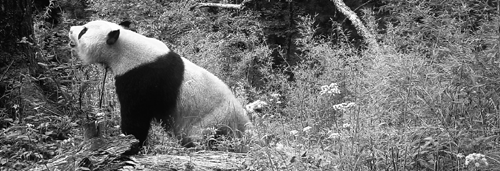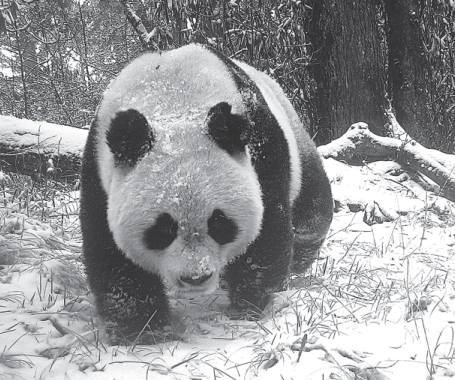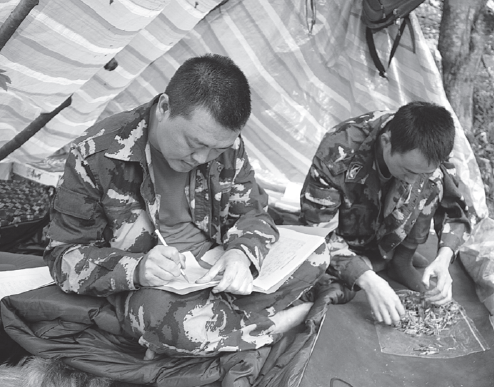Pandering to a wild style of life
He Liwen has devoted more than two decades to the protection of flora and fauna at a nature reserve in Northwest China, where many pandas live, Wang Ru and Ma Jingna report.

On June 9, He Liwen was pleased to receive an unusual delivery. Some people who had found two small bears that somehow got separated from their mother, after buying them some milk, brought them to the administration office of the nearby Baishuijiang Nature Reserve in Northwest China's Gansu province.
"It means people's awareness to protect wild animals has improved," says He, director of the giant panda management office at the reserve.
Having worked as a protector of wild animals, especially pandas, for 24 years, He has devoted himself to the cause and witnessed the changes in wild animal protection and that of the reserve's ecological environment.
The most recent national wild panda survey, which was published in 2015, shows there are 1,864 wild pandas nationwide, which are distributed throughout Sichuan, Shaanxi and Gansu provinces-110 of which live in the Baishuijiang reserve.
According to He, although the International Union for Conservation of Nature reported that the giant panda population had improved enough for the endangered species label to be downgraded to "vulnerable" in 2016, giant pandas are still threatened as their habitat is very fragmented.
"Because of natural reasons and human activities, like building roads and developing scenic spots, wild pandas are divided into small populations, which adversely influences their reproduction."
As a result, pandas are still in need of protection. He points out that means more than just safeguarding the pandas, but also their habitat and all of its other flora and fauna.
"The panda is an umbrella species. Protecting it can indirectly protect many other species, like the golden monkey that make up the ecological community of its habitat."
He Liwen embarked on his conservation journey when he was assigned to work at the reserve after graduating as a forestry major in 1996. The giant panda management office where he works is responsible for patrolling the reserve, monitoring the status of the wild animals, saving injured creatures and promoting awareness of the importance of animal protection.
"We patrol once a month, to check for, and deter, poaching in the reserve. We also check the activity and distribution of the animals, based on images caught by infrared cameras we have set throughout the reserve, as well as collecting hair and feces for analysis."
Five people from He's office, and about 70 people from six protection stations and a panda domestication and reproduction center at the reserve take turns to work in the wild. They often go into the forest in groups of three to five people, and stay for periods between several days to two weeks.
He Liwen and his colleagues have encountered many challenges while out in the wild, either because of the difficult mountain terrain, changeable weather or both. He still remembers once, when engaged in a survey, the group had hiked to an altitude of 3,700 meters with a plan to return the following morning. However, 10 minutes into their descent, they met heavy fog and were forced to wait it out since they could not see where they were going. When the fog lifted and the group were able to resume, it rained heavily. Between 7:30 am and 7 pm, the group descended to a height of 1,800 meters but the rain never stopped.
The group was soaked through, and were quivering with the cold, but they struggled to light a fire because of the persistent downpour. Finally, five of the team held aloft a piece of canvas like a tent to offer some protection from the rain and lit a fire underneath.
"As we had walked, eaten and even slept in the rain, all of us were soaked. The rain didn't stop until 4 am the next day. It was really a tough experience," he said.
Over the years, He has seen the progress in protecting the animals and ecology of the reserve firsthand. "Cameras can capture more images of mother pandas and their babies, and we can see animals more frequently in the wild than before.
"A few years ago, we could not even catch a glimpse of animals in the wild, but during a survey in 2019, my colleagues saw four pandas within just two days, and during another task in March, we saw another two," notes He.
The veteran ranger says he believes the increased frequency with which the cameras capture the animals proves that the environment is getting better in the reserve.
"For example, due to hunting, forest musk deer were endangered and rarely seen, but in recent years, their number has obviously increased, since we have caught many images of them on camera."
Like the aforementioned folks who delivered the baby bears to him, he recognizes that people's desire to protect animals and their awareness of the need to do so have improved, especially since China implemented the second phase of its natural forest protection program in 2011. Additionally, more people who live within the confines of the reserve are engaged with forest protection.
"Protection tasks for the forests in our reserve have been assigned to specific households, and people can earn some money for their work. Because of this, we gain more effort for the protection cause," he says.
Technological advances have helped in He's work, too. Since the end of last year, cameras set in the wild have been equipped with a panda recognition system, which can automatically identify giant pandas that appear within the cameras' detection zones, while at the same time inform people in the administration office and begin recording. However, He concedes that the system still needs a little more tweaking to identify animals more accurately.
"The system can identify pandas with an accuracy of 98 percent, but it has difficulty in identifying many other animals since they don't remain still and look at the cameras as people would.
"Next, we want to establish a database which contains all of the images captured by our cameras, so that the system can make comparisons, analyze and better recognize the animals. We hope that such a database can provide greater support in our protection work," he adds.
Although the job is tough and challenging, He doesn't regard it as work, describing it as both "painful and joyful".
"I always feel overjoyed when I get close to the animals in the wild. I get to see many views and animals that other people do not."




Today's Top News
- Xi chairs CPC leadership meeting on Party conduct, anti-corruption work
- Why Hainan Free Trade Port stands out
- Rule of law strengthens business environment
- Documents affirm one-China principle
- Central SOEs urged to push upgrading
- Agreement boosts ocean governance






























